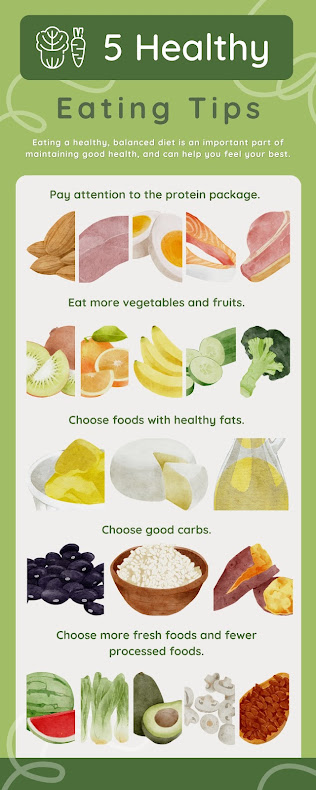Impact of Eating Healthy: 7 Tips on How to Eat Better and Achieve Optimal Health
Eating healthy is an essential component of achieving optimal health. It not only improves physical and mental well-being but also reduces the risk of chronic diseases. In today's fast-paced world, where convenience often takes precedence, it is crucial to prioritize nutrition. Our dietary choices have a significant impact on weight control, disease prevention, and overall health. Adopting a balanced nutrition strategy and practicing mindful eating is key to promoting general well-being.
 |
| 7 Tips on How to Eat Better and Achieve Optimal Health |
Color Your Plate: Boosting Wellness with Fruits and Vegetables
Revitalize your eating habits by incorporating more fruits and vegetables into your meals. Embrace the UK's NHS '5 A Day' recommendation, which encourages the consumption of a variety of colorful produce. Enhance your meals with vegetable sides, refreshing salads, and the nutritious and delicious goodness of fresh, seasonal fruits. Additionally, starting your meals with greens and protein can slow down carbohydrate absorption, benefiting individuals managing diabetes or pre-diabetes.
 |
| 5 Health eating tips |
Hydration Habits
Proper hydration is vital for maintaining optimal bodily functions. While the general recommendation is to consume approximately eight glasses of water per day, this may vary based on physical exertion and exposure to hot weather. Option for hydrating beverages such as tea, coffee, unsweetened lemon juice, and thin buttermilk over sugary carbonated drinks. Be mindful that even juices or smoothies without added sugar may contain naturally occurring sugars that can impact dental health.
Limiting Saturated Fat and Sugar
Understanding the impact of fats and sugars on our health is crucial. Saturated fats, often found in processed foods and oils, are generally considered unhealthy, while unsaturated fats are healthier when consumed in moderation. Reducing saturated fat intake promotes overall well-being. Similarly, managing sugar consumption is important to prevent issues like obesity and tooth decay. Be mindful of added or naturally occurring sugars in food and drinks, aiming to limit intake to less than 5 grams per 100 grams.
Active Living: Enhance Your Well-Being
Nutrition extends beyond food and encompasses an active lifestyle. Prioritize frequent movement, especially for those with sedentary jobs, to maintain a healthy weight range. Regular physical activity not only aids in weight management but also establishes a positive cycle between mobility and body fat. Recognize the synergy between nutrition and staying active to unlock a healthier and more energized lifestyle.
 |
| Eating lots of direct foods |
Sodium Savvy
Excessive salt consumption raises the risk of high blood pressure, which can lead to heart disease and stroke. Adults and children over 11 should aim for a salt intake of around 6 grams per day. When purchasing packaged foods, check the labels for salt content, and consume products with over 1.5 grams per 100 grams in moderation or avoid them altogether.
Cravings and Comfort: Understanding the Connection
While comfort foods hold a special place in our hearts, they should be enjoyed occasionally and in moderation within a balanced diet. Overindulgence can lead to regret and excess calorie intake. Restricting these foods entirely may result in feelings of deprivation and mood swings. Seeking guidance from a medical professional or health coach can help develop a tailored approach, accommodating favorite foods and drinks in reduced frequency or quantity.
Mood, Mind, and Food
Our emotional state significantly influences our dietary choices and overall well-being. Stress, anxiety, and burnout can impact how and what we eat. While food can provide comfort and a sense of control during stressful times, relying on it as an escape can lead to overeating. By cultivating awareness of mental health conditions and practicing emotional regulation, we can develop emotional resilience and work towards achieving our health goals.
Conclusion:
Healthy eating is a gateway to a vibrant and fulfilling lifestyle. Individuals must find an eating pattern that truly satisfies them while aligning with their nutritional needs. Consulting with a healthcare professional or registered dietitian can provide expert guidance in designing the right diet for optimal health. Embracing a balanced nutrition approach energizes our bodies, boosts the immune system, and enhances vitality. Remember, we are what we eat!
References:
NHS. (n.d.). 5 A Day portion sizes. Retrieved from https://www.nhs.uk/live-well/eat-well/5-a-day-portion-sizes/
Mayo Clinic. (2021). Water: How much should you drink every day? Retrieved from https://www.mayoclinic.org/healthy-lifestyle/nutrition-and-healthy-eating/in-depth/water/art-20044256
NHS. (n.d.). Salt: the facts. Retrieved from https://www.nhs.uk/live-well/eat-well/salt-the-facts/
Harvard Health Publishing. (2021). The truth about fats: the good, the bad, and the in-between. Retrieved from https://www.health.harvard.edu/staying-healthy/the-truth-about-fats-bad-and-good
healthy diet plan, healthy diet chart, healthy diet foods, healthy diet plan for weight loss, healthy diet menu, healthy diet meal plan, healthy diet for pregnancy, healthy diet for weight loss females, healthy diet for glowing skin, heart-healthy diet, heart-healthy diet plan, osteoporosis healthy diet, kidney healthy diet, liver healthy diet, gut-healthy diet, is keto a healthy diet, balanced healthy diet, gut healthy diet plan, is vegan a healthy diet, healthy heart diet, healthy liver diet, healthy gut diet, healthy kidney diet, healthy balanced diet, healthy pregnancy diet, healthy gut diet plan, a healthy keto diet, healthy skin diet, healthy snacks for diet

.png)



0 Comments
If you have any doubts, Please let me know.